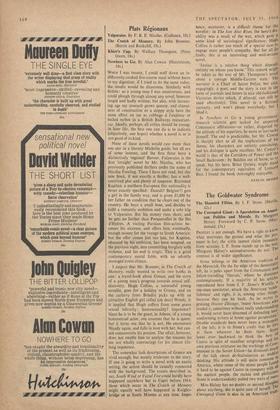Plats Regionaux
WHEN I was twenty, I could wolf down an in- differently-cooked five-course meal without harm to my digestion; if I tried to do the same today, the results would be disastrous. Similarly with fiction: as a young man I was omnivorous, and could plough through almost any novel, however turgid and badly written; but also, with increas- ing age my stomach grows queasy, and clumsi- ness of construction or a sloppy style have the same effect on me as cabbage c) I'anglaise or boiled turbot in a British Railways restaurant- car. Ideally, perhaps, all critics should be young; in later life, the best one can do is to indicate (objectively, one hopes) whether a novel is or is not good of its kind.
None of these novels would rate more than one star in a literary Michelin guide, but all are of some interest, and the first three have a distinctively 'regional' flavour. Valparaiso is the first 'straight' novel by Mr. Nicolas, who has previously published thrillers under the name of Nicolas Freeling. These I have not read, but this new book, if not exactly a thriller, has a well- contrived plot and plenty of suspense. Raymond Kapitan, a northern European (his nationality is never exactly specified: Danish? Belgian?) gets a girl in the family way, and is given £1,000 by her father on condition that he clears out of the country. He buys a small boat, and decides to fulfil a romantic ambition and make a solo trip to Valparaiso. But his money runs short, and he gets no farther than Porquerolles in the Iles d'Hyeres. A visiting Parisian film-actress be- comes his mistress, and offers him, eventually, enough money for the voyage to South America; but the offer comes just too late, for Kapitan, obsessed by his ambition, has been tempted, on the previous night, into committing burglary with violence, and his end is tragic. This is a good contemporary moral fable, with an adroitly managed ironic climax.
I suspect that Mr. Brunner, in The Crutch of Memory, really wanted to write two books in one : a travel-book about Greece, and the story of a young man's progress towards sexual self- discovery. Hugh Collins, a successful young novelist, goes for a holiday to Greece, and on the carferry from Brindisi picks up with an attractive English girl called (oh dear) Wendy. It is implied that Hugh suffers from some grave sexual infirmity: homosexuality? impotence? Since he is to be the guest, in Athens, of a young homosexual actor, one assumes that he is queer, but it turns out that he is not. He encounters Wendy again, and falls in love with her, but can- not consummate his passion. The affair, however, does not enable him to analyse the reasons (to me not wholly convincing) for his almost life- long impotence.
The somewhat lush descriptions of Greece are vivid enough, but mainly irrelevant to the story. If one is going to write a novel with an exotic setting, the action should be casually connected with the background. The events described in, say, South Wind or Vestal Fire could hardly have happened anywhere but in Capri before 1914; those which occur in The Crutch of Memory might equally well have happened in Knights- bridge or at South Mimms at any time. Impo- tence, moreover, is a difficult theme for the novelist: in The Sun Also Rises, the hero's dis- ability was a result of the war, which gave it some kind of sociological significance; Hugh Collins is rather too much of a special case to engage most people's sympathy. But for all its _ faults, this is an interesting and well-written novel.
'Justice is a relative thing which depends entirely on whom you know.' This remark might be taken as the text of Mr. Thompson's novel about a corrupt Middle-Eastern state. The narrator is a Chief of Secret Police, but also, engagingly, a poet, and the story is cast in the form of journals and letters (a nice old-fashioned Victorian device which, if demode, can still be used effectively). This novel is a fictional curiosity, and won't please everybody; but I liked it.
In Nowhere to Go a young government- research scientist gets sacked for suspected Communist affiliations—or rather, disgusted by the attitude of his superiors, he more or less sacks himself. The end is predictable, but Mr. Cowan is sharply alert to all the implications of his theme, his characters are entirely convincing, and his dialogue is quite excellent. Mr. Cowan s world is that of the Corridors of Power and the Small Backroom : by Balchin out of Snow, so to speak, but his hero, Brian Quiney, might stand for the contemporary equivalent of Leonard Bast. I found the book thoroughly enjoyable.
JOCELYN BROOK0






























 Previous page
Previous page